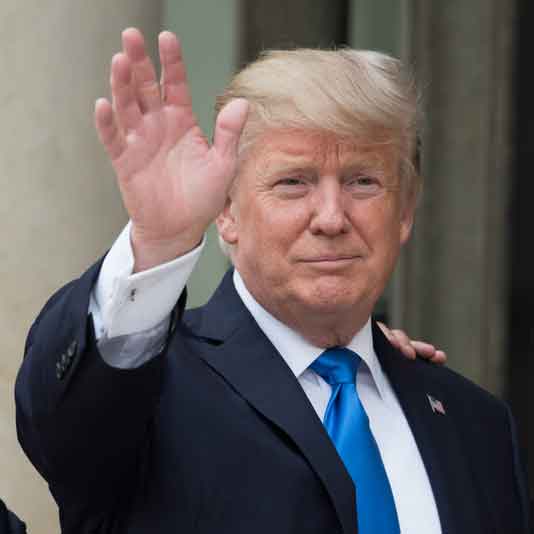President Donald Trump discussed the differences between his two presidential terms in a new interview with The Atlantic, published on April 28, where he claimed to lead both “the country and the world.”
“The first time, I had two things to do — run the country and survive; I had all these crooked guys,” Trump said in the interview. “And the second time, I run the country and the world.”
Since returning to office in January, Trump has utilized extensive executive power across various policy areas, notably with his immigration and trade strategies drawing significant attention and debate. His administration’s firm deportation policies have encountered legal challenges, yet he continues to support these actions.
Trump’s trade policies have unsettled global markets and stressed relations with longstanding U.S. allies. He has enacted extensive tariffs impacting numerous countries, including key U.S. trading partners, although some nation-specific tariffs were delayed until July. This unpredictability in trade measures has heightened economic tension worldwide.
Some backers describe Trump’s trade tactics as strategic negotiation. Billionaire Bill Ackman called the approach “brilliantly executed,” as reported by the BBC. However, the tariffs have faced opposition from economists and some Republican senators, one of whom labeled the 10% baseline rate as “bad.”
The economic policies under Trump have also prompted shifts in global security alliances. According to Chatham House, European and Asia-Pacific allies are reassessing their security reliance on the United States due to Trump’s tariffs. European nations are strengthening their defense capabilities and decreasing dependence on U.S.-produced military equipment, which could lead to more competitive defense sectors eventually challenging American ones.
Trump’s remarks about acquiring Greenland and suggesting that Canada could join the United States have drawn attention. Concurrently, he has focused significant efforts in his early months in office on negotiating a ceasefire between Russia and Ukraine.
When questioned about pursuing a third term, Trump showed reluctance. “It’s not something that I’m looking to do. And I think it would be a very hard thing to do,” he told The Atlantic. However, during a rally in Michigan, he reportedly hinted at the possibility, despite such a move being unconstitutional.
Trump stated that during his second term, wealthy elites have shown him more respect. He noted improved relations with billionaires like Jeff Bezos and Mark Zuckerberg.
The president also addressed internal challenges, particularly involving Defense Secretary Pete Hegseth, who has been scrutinized over the Signal scandal and Pentagon issues. Trump expressed continued support for Hegseth, indicating he would “get it together.”
Regarding his immigration policies, Trump acknowledged the difficulty of achieving perfection. He told The Atlantic that nothing will ever be completely flawless in deportation efforts, suggesting that some errors may occur.
In a rally in Michigan, which resembled a campaign event, Trump declared his administration had achieved “the most successful first 100 days of any administration.” He emphasized his immigration policies, including “mass deportation” efforts, and defended his protectionist trade approach, despite criticism.
When asked about potential economic issues stemming from his tariff policies during an ABC News interview, Trump dismissed worries, telling reporters that “Everything’s going to be just fine.”
The administration has implemented measures to alleviate some tariff effects, particularly for automakers, while simultaneously criticizing Amazon’s plan to reveal how tariffs impact product prices.
Now that President Donald Trump’s second term has reached the 100-day mark, there has been a notable decline in public approval and increasing legal scrutiny over his administration’s policies and statements.
During the recent interview with The Atlantic, Trump claimed to hold leadership over both the nation and the world, a statement that has faced criticism from political analysts and legal experts. They argue that such statements reflect an overreach of executive power and a disregard for constitutional limits. Legal scholars have pointed out that Trump’s assertion of global leadership lacks any legal basis and could undermine the principles of democratic governance.
Public opinion mirrors these concerns. A PBS News/NPR/Marist poll indicates that nearly half of Americans assign Trump a failing grade for his performance thus far, with approval ratings hovering around 39%—the lowest for any president at this stage in decades. Criticism spans across various policy areas, including immigration, trade, and foreign affairs. Notably, his aggressive deportation policies have faced legal challenges, and his trade tariffs have been blamed for economic instability and strained international relations.
Trump’s statements have also raised eyebrows in the judiciary. Courts have pushed back against several executive orders, emphasizing the importance of checks and balances. For instance, federal judges have blocked certain immigration policies, citing constitutional violations. Legal experts warn that Trump’s rhetoric and actions could erode the rule of law and set dangerous precedents.
Despite these challenges, Trump maintains a loyal base. Supporters argue that his bold approach is necessary to disrupt the status quo and implement long-overdue reforms. However, the growing divide between the executive branch and other institutions underscores the contentious nature of his presidency.
As Trump’s second term progresses, the interplay between his administration’s assertions of power and the responses from the public and legal system will continue to shape the political landscape. Observers remain watchful of how these dynamics unfold and the implications for American democracy.

